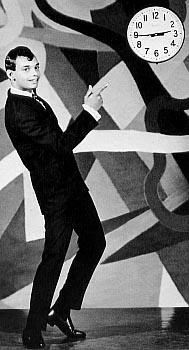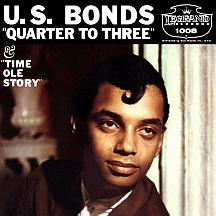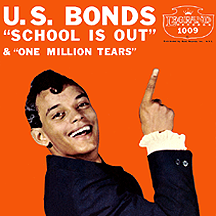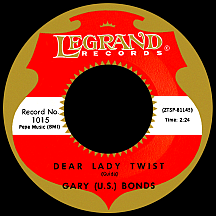GARY (U.S.) BONDS
A high-profile career performing music was the dream Gary Anderson clung to while growing up. His family had moved northward from Jacksonville, Florida to Norfolk, Virginia during his infancy; it turned out to be a good spot to pursue his dreams outside the more obvious creative centers of N.Y., L.A., New Orleans, Chicago, Memphis, Nashville, et al. The street corner vocal group cliché applied to him as it did to the teenagers of those larger burgs; his group The Turks spent a good chunk of the mid-'50s harmonizing on Norfolk's streets and occasionally in or on nearby Virginia Beach. Later, Gary became a regular customer at Norfolk's hottest record store, Frankie's Birdland.
The store's owner, Frank Guida, was originally from Palermo, Italy. His family emigrated to the Bronx and a hitch in the U.S. Army during World War II found him in Trinidad, where he developed a fondness for the rhythms of the island nation. He worked as a calypso singer in Harlem and Greenwich Village nightclubs in the early '50s, then moved to Norfolk and opened his first record store on Church Street in 1954, the plan being to learn the music business at the retail level. About five years later he established Legrand Records, recording Tommy Facenda (formerly a member of Gene Vincent's Blue Caps) doing "High School U.S.A.," which became a national top 40 hit after Atlantic picked it up and 28 regional versions were painstakingly produced and distributed.
Guida and his songwriting accomplice Joe Royster (who also worked as a haberdasher at Shulman's clothing store in downtown Norfolk) penned "New Orleans" ('...you ain't been to heaven if you ain't been there!'), a tribute to one of the country's party capitals (I suppose it seemed more marketable than a song about Norfolk's nightlife). Gary Anderson had been singing around town at a few small clubs and Frank approached the clean-cut young hopeful. Though he wasn't wild about the song, Anderson recognized the opportunity and did the session, unaware that Guida was impressed with his image more than his vocal ability but figured on using some studio tricks (echo, double-tracking) to compensate for Gary's perceived shortcomings as a singer.
A distribution deal was arranged with New York's Laurie Records. After copies were pressed, Gary realized he'd been bamboozled: the label said By - U.S. Bonds! Guida has admitted he'd seen a poster promoting the government-backed savings certificates and decided to use a little trickery to get disc jockeys to listen to the disc, or inadvertently schedule it as a public service announcement...or whatever, as long as he got their attention. The ploy worked, though perhaps it wasn't necessary; rough-edged, heavy on the drums, the tribute to the city a thousand miles south '...where the magnolia blossoms, they fill the air...' was a fast-rising hit, top ten in November 1960. Gary was stuck with his new name.
A few words about two Daddies: Bishop Marcelino "Daddy" Grace, a loud, flashy minister if there ever was one, held services at the United House of Prayer on the corner of Church Street and Princess Anne Road in Norfolk. Frank Guida often drove past the church and couldn't help hearing the commotion going on inside with Grace and hundreds of devoted, excitable followers. High school teacher and saxophonist Gene Barge (who'd had one single on Checker in the mid-'50s and had played on some of Chuck Willis's biggest hits), who hadn't been involved with Gary's debut disc, put out an instrumental with The Church Street Five, a group of local musicians. The fiery preacher's name inspired Guida to give Gene a similar handle; "A Night With Daddy 'G' (Part 2)," an early '61 Legrand release that was a hit in a few cities (Philadelphia, Chicago, Los Angeles), disappointed on a national level.
The second U.S. Bonds single, "Not Me," was written by Gary and Frank and charted well below the typical level for a follow-up to a major hit; a theory as to its failure concerns the song's subject of street fighting (though I'm not sure how a line like '...you better shut up 'fo' I bust you in your lip' would be considered offensive enough to deflect airplay). The song was a hit when The Orlons remade it, lyrics intact, two years later. Guida couldn't stop thinking about the church commotion happening just down the street, so he attempted to duplicate the sound on record with Bonds' third single. "Quarter to Three" was built on the melody of the CS5's "Daddy 'G'" tune, with Gene Barge taking part both as sax man and a character in the song's lyrics (composing credit was a catch-all: Barge-Guida-Anderson-Royster). Guida hired a group of adolescents to create the atmosphere of an enthusiastic crowd, then overdubbed sounds until the finished product would convince anyone it had been recorded at a live show. The single hit number one in July 1961 (an amazing bouncing-ball rebound from first to second to third effort) and served as the blueprint for "The Norfolk Sound," as most subsequent recordings used the same technique.
Representatives of the distributing company, Laurie Records, weren't thrilled with the low-fi quality of the master tape, but because of its stark difference from anything else that was out, the song received a lot of attention. A problem arose when Dion's "Runaround Sue," on Laurie, hit the radio with a sound Frank felt was too similar to "QT Three" (but was it really?). Gary didn't mind and any grievance blew over quickly. There was one issue in the partnership of Guida and Anderson: something had to be done about the name. A compromise was made and Gary (U.S.) Bonds is how he's been identified ever since. Five more hits in a row added to Gary's string, all but the last penned by different combinations of the four main participants. Gene Barge lent his sax skills to all of them; "School is Out" celebrated warm weather leisure time and had a late-summer run in the top ten, then in the fall, "School is In" applied the same happy attitude to classtime camaraderie.
Jumping on the hottest of all dance trends, Gary took both "Dear Lady Twist" and "Twist, Twist Señora" to the top ten in the first half of 1962, around the time he appeared in the British film It's Trad, Dad! (which played in U.S. theaters later in the year under the title Ring-A-Ding Rhythm!), directed by Richard Lester (the Philadelphia-born, soon-to-be-legendary helmer of A Hard Day's Night starring The Beatles). An odd approach was used, combining jazz acts like Chris Barber, Mr. Acker Bilk, Kenny Ball and The Temperance Seven (more or less lending truth to the movie's title) with British rock and rollers Craig Douglas, The Brook Brothers, John Leyton and Helen Shapiro and U.S. acts Chubby Checker, Del Shannon, Gene McDaniels, Gene Vincent and The Paris Sisters; Gary lip-synced "Seven Day Weekend," a Doc Pomus-Mort Shuman song that reached the stateside top 30 in the summer.

"Copy Cat" and "I Dig This Station" made minor chart appearances in the latter half of 1962. Guida started a new label, S.P.Q.R., with distribution by London records, while Bonds remained on Legrand. Frank offered Gary a chance to do an updated version of a 1934 Trinidadian song, "Marry an Ugly Woman," and Gary judiciously refused. So Jimmy Soul (who'd already had a hit with "Twistin' Matilda" on S.P.Q.R.) made "If You Wanna Be Happy" and against all odds it shot to number one in the spring of '63! Gary spent about four more years making records for Legrand; at one point in 1965 he was backed by The Rhondels (Bill Deal's band), an act from nearby Portsmouth that finally enjoyed a few hits in the late '60s after about ten years of trying.
After parting ways around 1968, Bonds made a few records for New York companies (the small Botanic label and two bigger ones, Atco and Sue), and Guida opened another Norfolk record outlet, Frankie's Got It Records, that stayed in business for the next 20 years. Gary often did live shows, but by the mid-'70s few were taking him or his musical style very seriously...the exception being one fan named Bruce Springsteen. The two met in 1976, shortly after Springsteen had broken through with "Born to Run," when Bruce went to a show where Gary was performing, joined him onstage, and something clicked. Turns out the Jersey-born rocker had been strongly influenced by Bonds, the sax work of Daddy "G" and those early-'60s hits. The two formed a "bond"...did I really just say that? They made records together, resulting in "This Little Girl," a smash for Gary in 1981 written by Bruce and co-produced with "Miami" Steve Van Zandt of Springsteen's E Street Band, followed by "Jolé Blon" (with "The Boss" joining in on vocals) and another top 30 hit, "Out of Work," in 1982.
Gary's been rockin' steady ever since. For years he's hosted his own birthday parties at his favorite Long Island night spots, kicking off each summer throwing an informal public jam with Daddy "G" Barge and other surviving musician pals from his glory days, plus buddies from the Boss's band, various eastern shoreline luminaries and a never-know-who'll-be-there brotherhood of rock and soul stars (Chubby Checker, Chuck Jackson, Bobby Lewis, Jon Bon Jovi and Paul Shaffer have all been known to drop by). Without Frank Guida's weird little name-changing trick, maybe none of this would have happened. There apparently wouldn't have been a "Runaround Sue" without "Quarter to Three." The Bruce Springsteen everyone knows might have emerged as a whole different kind of cat if Gary hadn't been around at the right time. And an enviable E Street resurgence in the career of Gary (U.S.) Bonds might never have been possible if Bruce hadn't been inspired by the young U.S.B. in the first place. Rock's progression can turn on a dime; I suppose without Elvis we wouldn't have any of 'em. And all those parties that have raged on 'til at least 2:45 in the wee hours would be quietly winding down around 9:15.
NOTABLE SINGLES:
- New Orleans - 1960
as By - U.S. Bonds - Not Me - 1961
as U.S. Bonds - Quarter to Three - 1961
as U.S. Bonds - School is Out - 1961
- School is In - 1961
- Dear Lady Twist /
Havin' So Much Fun - 1962 - Twist, Twist Señora - 1962
- Seven Day Weekend - 1962
- Copy Cat - 1962
- I Dig This Station - 1962
- Where Did That Naughty Little Girl Go - 1963
- No More Homework - 1963
- The Music Goes Round and Round - 1964
by Gary (U.S.) Bonds and Daddy "G" - Oh Yeah - Oh Yeah - 1964
by Gary (U.S.) Bonds and the Stompers - You Oughta See My Sarah - 1965
by U.S. Bonds and the Rhondels / - My Little Room - 1965
by Bonds Brothers and the Rhondels - Take Me Back to New Orleans - 1966
- Send Her Back to Me - 1967
- I'm Glad You're Back - 1968
- This Little Girl - 1981
- Jole Blon - 1981
- Out of Work - 1982
- Standing in the Line of Fire - 1984




